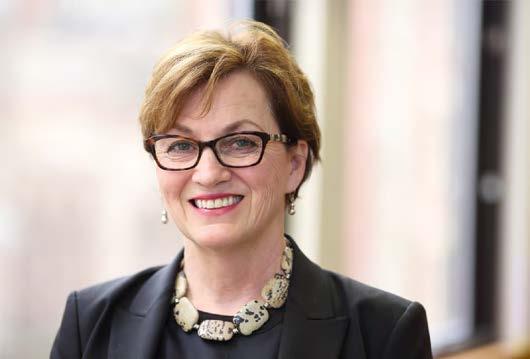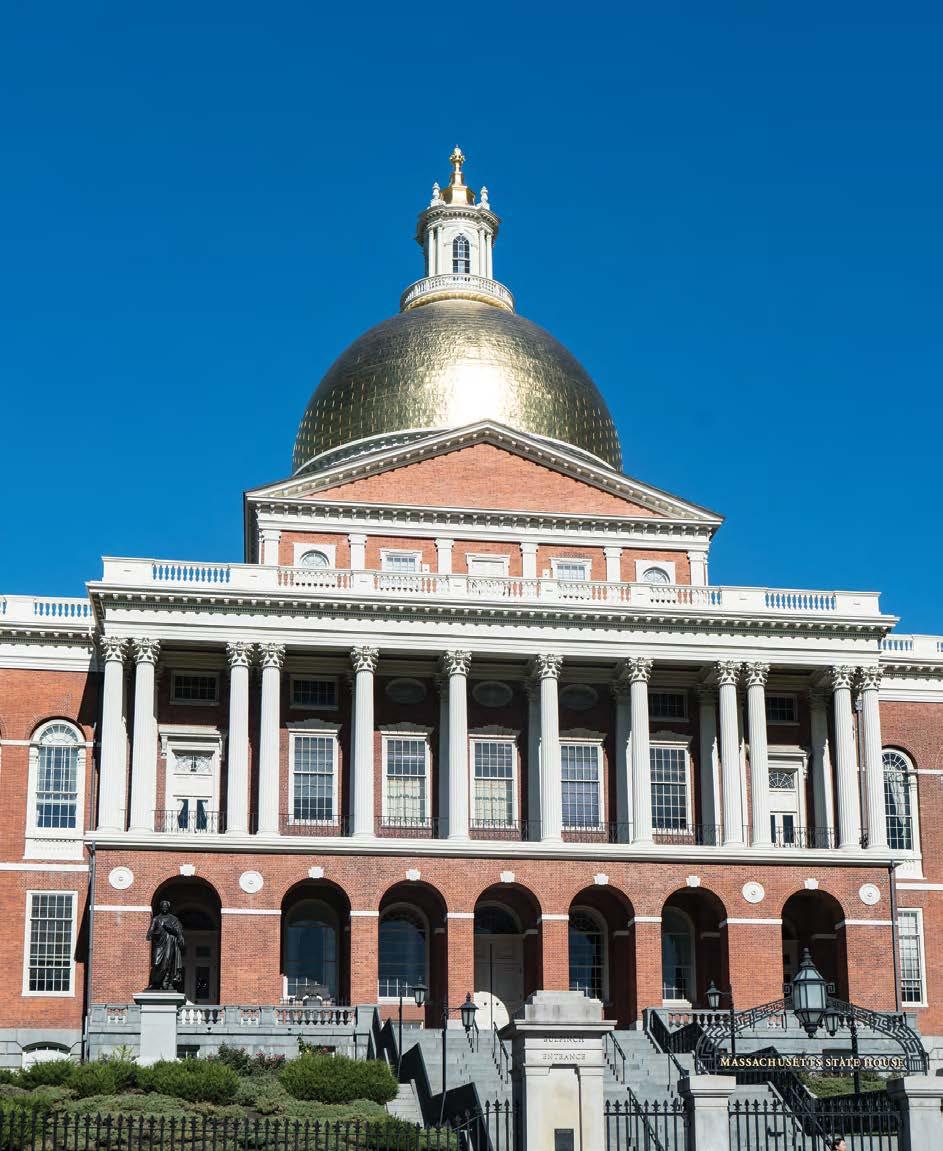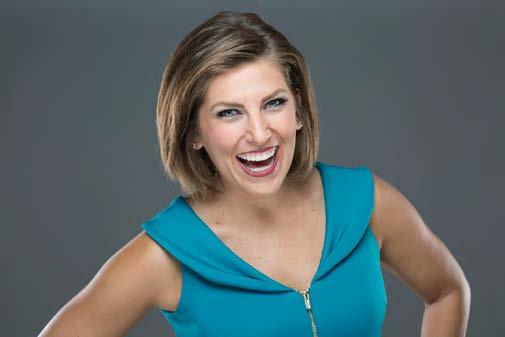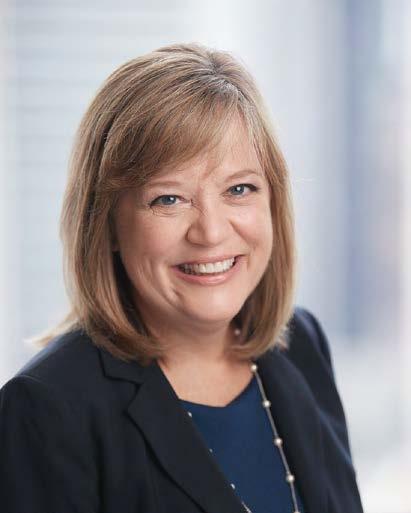
15 minute read
Silver Linings Playbook
Six alumnae share stories of COVID-19 – lessons learned, changing priorities, and appreciating the little things
We have all been changed by COVID-19. Exactly how and whether those changes will be short-term or longlasting remains to be seen. This spring, eight weeks into the pandemic, we checked in with six alumnae, spanning four decades and a wide variety of careers, and asked each to reflect on her experience over these past few
Advertisement
months and how it called her to live Ursuline’s motto of Serviam (I will serve).
Maggie Burns ’76
Vice President, Philanthropy and External Affairs St. Francis House, Boston
Every day, St. Francis House – the state’s largest day shelter for unaccompanied adults – sees 500 people come through its doors. Open from 6:30 a.m. to 3:00 p.m. in downtown Boston, St. Francis House provides critical services to some of the city’s most vulnerable residents. “We serve breakfast and lunch every day,” says Maggie Burns, who has been with the organization for eight years. “We also provide clothing, workforce development, case management, mental health counseling, and affordable housing.”
When the coronavirus struck, stringent infection control required St. Francis House to dramatically narrow the scope of its support. “We had to pivot everything we were doing to focus on essential services: food and emergency clothing,” says Burns,

– Maggie Burns ’76
who oversees fundraising and communications for the human services agency. “We had to send as many staff as we could home, and we had to stop workforce development to try and manage the number of people who come to St. Francis House.”
Still, 400 homeless women and men have kept coming daily in search of a hot meal – a reality that has required more than a little creative thinking. “We used to have set times for breakfast and lunch,” Burns explains. “We have now changed to a to-go model so that people can take food outside of the dining area. We are trying to minimize how many people are in the dining room at one time. We are giving masks to everyone who comes in; staff also have to wear face shields. We have a full-time facilities team that is cleaning and disinfecting throughout the day. They are supplemented by an outside company that comes in after hours to sanitize the building.”
All of these measures have brought added costs, which is why Burns is happy to report that fundraising totals are up. “People are so good. They’ve stepped up,” she says. “In times of crisis, donors tend to refocus on human services.”
From the 10,000-foot level, Burns believes that COVID-19 will bring about positive change. “This pandemic has helped to shine a light on the need for more affordable housing. We need that housing, and we need to prepare people to be housed, with more services for mental health and substance use.”
Burns is optimistic that these things will come about in the long run. In the meantime, “This pandemic has taught us to take nothing for granted. It has reinforced how grateful I am for the little things I have,” she says.
“I have always worked for nonprofits because I wanted to give back – something that comes from my time at Ursuline,” she concludes. “We were taught love and compassion, and that everyone deserves dignity.”
Nora Kate O’Brien, R.N. ’10
Emergency Room Nurse Brigham & Women’s Hospital, Boston
It doesn’t get any more front line than working as a nurse in a hospital emergency department in one of the cities hardest hit by COVID-19. And yet, a week into the pandemic, Nora Kate O’Brien found herself taking on a second, part-time job: on-call triage nurse for the Boston Police Department (BPD).
“My mom oversees occupational health for the BPD,” she explains. “On March 22, they had an overwhelming number of voicemails and emails from officers who were worried about potential exposure to the coronavirus.” Leadership sprang into action, hiring a team of nurses to field overnight calls to the department’s COVID-19 hotline.
On March 23, O’Brien began answering calls from officers in an effort to determine their risk for exposure. The team kept track of everyone they responded to so that anyone who later developed symptoms could be tested and traced. “It’s been interesting, a completely different side of nursing than I’ve ever done,” says O’Brien. After two months, when the initial panic subsided and with new procedures in place at the BPD, she was looking forward to wrapping up her overnight work and returning to one full-time job. But she is grateful for the experience. “This has solidified that I don’t want a desk job. I like hands-on nursing,” she recounts.
Back at Brigham & Women’s, O’Brien says that every day has been a learning experience with new protocols in the ER. Every patient is assumed to have COVID until tested. O’Brien wears a surgical mask all the time, and there’s now a list of conditions that call for full personal protective equipment (PPE).
“When you see someone going into cardiac arrest, normally, you throw gloves on and get in there and do CPR. Now, we have to completely suit up, with a gown, N95 mask, and face shield. It’s


– Nora Kate O’Brien ’10


– Catherine Falvey ’11
frustrating because you’re delaying care. But you have to or you’re putting yourself and your coworkers at risk.” The constantly shifting landscape has made work “a bit of a roller coaster. The first few weeks, I was anxious and stressed out all the time. Now, I wear my PPE, wash my hands often, and do the best I can.”
In quiet moments, O’Brien finds her thoughts drifting back to Ursuline, where she has helped coach hockey the past few years. “I have been thinking about seniors, feeling bad that they are missing out on so much of their senior year. We never got to have a hockey banquet,” she reflects. “But if I could talk to them, I would tell them that they are lucky to have their health and their families. Better days are ahead. They will make it through.”
Catherine Falvey ’11
Legislative and Research Director for Massachusetts State Representative David Rogers
In B.C. (before COVID) times, Catherine Falvey primarily worked on cannabis legislation. Her boss, who represents the 24th Middlesex District, which includes parts of Cambridge, Arlington, and Belmont, chairs the Cannabis Policy Committee for the House. Since joining Rogers’ staff in July 2019, Falvey would help draft and review legislation and liaise with the state’s Cannabis Control Commission in an effort to keep up to date with this quickly evolving area of law.
In these A.C. (after COVID) days, Falvey has pivoted to the bread and butter of representative democracy: addressing constituents’ concerns. “I have had to dive into areas of law that I don’t typically deal with – small business, housing, unemployment – so it has been a lot of learning on the fly,” she says.
Falvey reports that another area of learning for her has been working at home. “I am used to being one of four staffers, sitting in a bullpen. You can look over at someone and ask a question to clarify something,” says Falvey, who is a lawyer by training. “When you are working remotely, it is a lot easier to miss things.” Then there have been the technological barriers. “Working for the state government is not like working for a company where everyone has a laptop and everything is in the cloud,” she observes.
“We are a much older, more historic organization. We still work on desktop computers.”
Despite the challenges, Falvey reports it has been especially fulfilling to be a public servant in these turbulent times. She had the opportunity to work on legislation Rep. Rogers filed to extend unemployment to independent contractors as well as expand the duration of benefits beyond 13 weeks.
“Watching lawmakers come together to pass legislation to help people has been very impressive. Everyone has prioritized working together on these issues,” she says. And where legislation often moves slowly and can sometimes be abstract, she has found it particularly satisfying to help constituents resolve issues so that they can handle the crisis and attend to their personal affairs.
“To help people who are struggling – who have lost their jobs or are in danger of losing their housing – and see results is definitely rewarding,” Falvey reflects.
Fifty years from now, what will she tell her grandchildren about living through this pandemic? “I will tell them how the government responded to help those who were in a disadvantaged position,” she says. “How the community came together, doing things like making masks or bringing food to elderly neighbors. While the coronavirus had a negative effect from a health standpoint, it has had a positive effect from an empathy standpoint.”
Elizabeth (Bitsy) Recupero, M.D. ’83
Clinical Champion, Office of Patient Centered Care and Cultural Transformation Veterans Health Administration, New Orleans
The Veterans Health Administration (VHA) is the largest healthcare system in the world, with 450,000 employees and 160 medical centers that serve 9 million veterans. For the past eight years, Dr. Bitsy Recupero has been leading the VHA’s efforts in what is called “whole health.” “Whole health is about putting the veteran at the center of healthcare,” she explains. “Rather than having the first question be, ‘What’s wrong with you?,’ we ask, ‘What’s important to you?’”
That question can influence the course of treatment that a doctor recommends. It is also invaluable in putting humanity and compassion at the forefront of medical care. This is the reason most doctors got into medicine in the first place, according to Recupero, and it is a sentiment increasingly lost in today’s transactional healthcare climate. That loss leads to provider burnout.
“I used to travel the country, offering workshops on topics like provider burnout,” she says. “These days, I am not traveling anymore, but the issue has never been more relevant. As you know from the news, healthcare workers are stretched extremely thin. Using a whole health approach, my office has been working to increase the resiliency of these frontline workers.” “We are going to be dealing with COVID-19 for years to come. This is a marathon. How do we build resilience, compassion, and caring – particularly when we don’t have enough primary care providers?”


– Elizabeth Recupero, M.D. ’83


– Caitlin Burchill ’08
A primary care physician, Recupero came to the VHA after years in private practice. She is based in New Orleans – one of the country’s coronavirus hotspots – and briefly thought about volunteering to go back to work in emergency medicine. “Then I had a reality check, asking myself, ‘Where are my skills most needed?’ I decided that was in supporting primary care.”
The hardest part of the pandemic for Recupero is that she is far from her extended family in the Boston area. The oldest of eight, she knows she won’t be able to travel back to New England anytime soon. “That is the most difficult thing for me,” she says. “But you know, I have an amazing job with amazing stability, which a lot of people don’t. I am very, very blessed. I take a walk every day and reflect upon that.”
Years from now, when and if she is interviewed about living through the pandemic, she will say this: “One day, the world woke up and things were completely different than the day before. It was scary and it seemed like it would never end. But it changed the world for the better. It brought public health disparities to light. It forced us to create new jobs and new opportunities for people.” Bottom line, says Recupero, “Any crisis is also an opportunity. Human beings have an inherent capacity to survive and get better from the experience.”
Caitlin Burchill ’08
Reporter NBC Connecticut
Caitlin Burchill worked in local television news in Maine and Utah before landing at NBC Connecticut in 2019. She had been doing a mix of morning and evening shifts until March, when things changed: she began filling in for a reporter on maternity leave on the morning shift full time. It felt like a big change – until the coronavirus hit. Then her professional world really turned upside down.
“The main focus of my job hasn’t changed. I am still breaking down issues, getting answers, and giving the people in the community the information they need,” Burchill explains. “But the way I do it has completely changed. I can’t go into the studio. We used to have 200 people in the building every day. Overnight, the engineering department had to shift operations so that no one enters the building. Everything is done remotely. It’s a completely different way of doing things.”
Based in West Hartford, a close suburb of the state capital, Burchill also found herself eerily near the center of the pandemic in the U.S. “This area has been impacted so greatly,” she says. With Manhattan only 100 miles to the south, “so many people commute into New York City.”
Burchill says she is grateful to have a job in a time of record unemployment, and doubly grateful to enjoy her coworkers. “I realize how lucky I am to work with great people. It’s a stressful situation, and we’re talking about pretty depressing stuff,” she reflects.
For Burchill, the bright spot in all of this coronavirus gloom may be that it elevates awareness of the essential role local news plays. “People are really turning to us for information,” she says. “In Connecticut, there has been so much appreciation for reporters. When I’ve been out on the road, people will come over to say, ‘Thank you for being out here and bringing us the news.’”
From a personal standpoint, Burchill notes that COVID-19 has brought about an “interesting period of reflection. As much as it’s awful, it has taught me the importance of staying connected to people I care about.” This includes her former teammates from Colby College, where she played varsity volleyball.
In May, Burchill had the opportunity to share these thoughts – and more – with the Class of 2020 at Ursuline’s virtual Senior Parent Brunch. “I told them how Ursuline shaped me as a human. I gained confidence along with compassion and empathy.” And Burchill left graduates with a charge, custom-made for these days of COVID-19: “Use your pent-up pandemic energy to change the world for the better.”
Suzanne Ferguson Burkhardt ’81
Head of Employee Relations Marsh & McLennan, New York City
From her base in Manhattan, Suzanne Burkhardt heads a team that advises and counsels Marsh & McLennan’s human resources community. The global professional services firm is made up of four distinct businesses – risk advising, insurance and reinsurance brokerage services companies Marsh and Guy Carpenter, and consulting companies Mercer and Oliver Wyman.
“We set policies, do government reporting, and run trainings for HR partners,” says Burkhardt, who is an attorney. “I am also part of the global crisis response team and the health and life safety team.” Since mid-March, that latter half of her job has taken over.
“Now it’s COVID all day, every day,” she continues. “Do we open? Do we close? How do you communicate that?” Her team, in fact, has become its own mini public health department, tracking the latest news on COVID-19 and its potential impact on the company’s 76,000 employees in 840 offices around the world. They are now in the thick of creating a flexible framework for reopening. “We are recommending starting with 10% of employees back in the office and not going above 40%.”
For a lawyer at a firm that assesses risk, this novel coronavirus is a “worst nightmare scenario. Right now, we don’t know all the facts. There is no template for what to do,” Burkhardt says. What will the new normal look like in corporate America? “It is anybody’s guess. After 9/11, employees had to sacrifice some personal freedom for safety when they traveled. Now, when the world returns to the office, will employees be willing to take and record their temperature? And what will this mean for the future of commercial real estate? If you have fewer people who need to be in the office, do you still need all of these buildings in major metropolitan areas? Will there be a shift outside of big cities to the ’burbs?”
And while it may be difficult to navigate uncharted territory, Burkhardt says she has found it comparatively easy to adapt to working at home. She doesn’t miss her daily three hours of commuting from Stamford, Connecticut, to Manhattan. In fact, she is grateful to be able to repurpose some of that time for exercise. Burkhardt has also found herself more in touch with her Ursuline classmates. “It’s amazing: during this pandemic, my class has been doing Zoom calls. And it’s not just the people I was really good friends with – it’s a big group. I have realized that the bonds we form at Ursuline are so different from those at other schools,” she concludes. “There is a special spirit of the place that sticks with you. It’s important to go back to that well in times like these to be renewed.”












